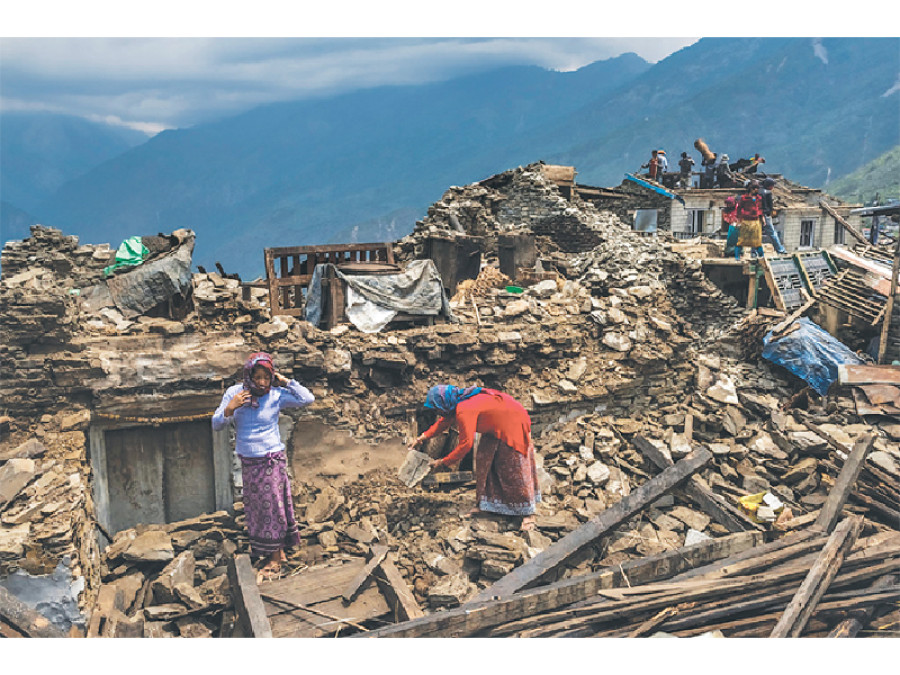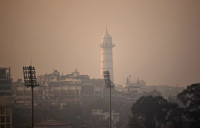Opinion
Housekeeping first
PM KP Oli must revive the Reconstruction Authority to jumpstart rebuilding and redevelopment
Shesh Ghale
Prime Minister KP Oli’s first announcement on assuming office was that his government would replace all tuins in Nepal with bridges within two years. Now, PM Oli must build on the momentum and revive the short-lived National Reconstruction Authority.
A massive earthquake shook our country half a year ago, but with so much happening around the constitution, it seems like the survivors have been simply forgotten. PM Oli has a lot of challenges to overcome—the blockade, the Tarai unrest, the next elections—but building back private houses and community buildings is a matter of life and death.
Begin reconstruction
Hundreds of thousands of Nepalis are still living in temporary shelters they set up with very little government help. The bamboo huts and other rudimentary structures with tin roofs were meant to keep the monsoon out, not the winter. We cannot expect survivors to spend the severe, sub-zero winter in tin huts.
But rebuilding must also ensure food security and include a package of programmes to turn our rural settlements into smartly-planned villages. In places like Barpak, where I travelled to with members of the Non Resident Nepali Association (NRNA) in the aftermath of the earthquake, they have very small yields and depend on food supplies on towns below.
There are hundreds of such pockets where food takes long to grow and never lasts a season and where people have lost a season’s crop and much livestock to the earthquake. If the government does not act fast, we will have a humanitarian crisis unfolding over the winter.
A lot of the hard work for reconstruction has already been done. The National Planning Commission has been instrumental in identifying and detailing the losses and damages. Although the government failed to legitimise the Authority through a bill, it did raise over $4 billion—half the required amount for rebuilding—at the International Conference on Nepal’s Reconstruction in June.
I have been visiting Nepali diaspora communities, Nepali embassies, diplomatic and consular institutions in Kathmandu, not-for-profit institutions, private individuals, and industry leaders to get feedback on how I can get help—in the form of donations, grants, or expertise—into Nepal.
I have repeatedly been told the lack of initiation on our part is the greatest hurdle that keeps friends of Nepal from making commitments. We need to develop a portfolio of projects to pitch to prospective donors and we need a clearly thought out method so that both the donors and the government feel that they can achieve their goals .
The mood among prospective partners was a lot more encouraging when the Authority was active for two weeks in August. But now, all momentum has been lost. If our government is slow to respond, aid will eventually go to organisations whose work will not adhere to their own goals, whose efforts might overlap, and whose spending is not efficient.
Beyond rebuilding
As this year’s Nobel Prize for Economics winner Angus Deaton suggests, poor countries really take off only when their government is strong. For that to happen, rebuilding has to begin immediately.
It must go beyond simply building back infrastructure to redeveloping the country. This is a chance for our country to really start doing things differently.
We must use this opportunity to make policy changes in order to attract investments. We must provide jobs to millions of our youngsters and prevent this crucial demographic from migrating for menial pay. We must take tourism east of Everest and west of Annapurna. We must encourage entrepreneurs and allow them to explore business prospects beyond our borders. Linking our trade to the booming South and East Asian economies is one sure-shot way of becoming that proverbial bridge between two giants.
As president of the Non Resident Nepali Association, I have also been travelling across the world to meet the Nepali diaspora, who are spread out in more countries than we have diplomatic missions in. From interactions over the last two years and our fundraising efforts after the quakes, I feel that the Nepali diaspora can become a true partner in rebuilding and redeveloping Nepal. The NRNA is going to rebuild 1,000 homes in quake-hit areas and we hope this can be the first of many efforts.
The damage caused by April’s disaster showed us what was wrong with the way this country is being run. But it also brought out the best in people and showed that Nepalis can show solidarity during an emergency. The government must now use this national experience to steer Nepal towards modernity.
Ghale is President of the Non Resident Nepali Association




 16.12°C Kathmandu
16.12°C Kathmandu











